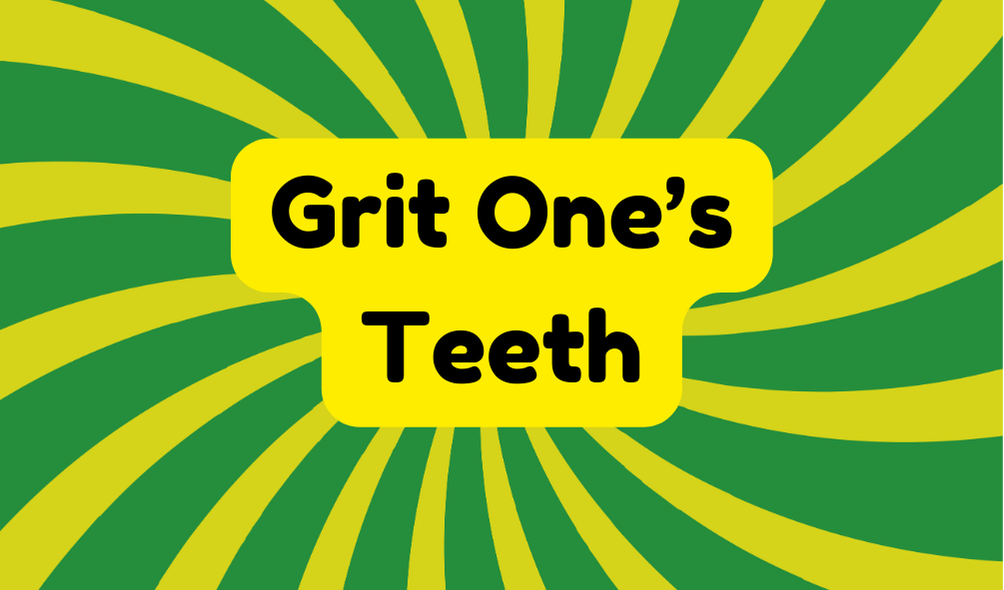The phrase "grit one's teeth" symbolizes a determined effort to endure tough situations, showcasing both physical and emotional strength amid challenges. This expression has roots in ancient Greek and Roman thought, appearing as a metaphor for resilience. Often, it is associated with enduring discomfort, like during strenuous workouts or stressful times. In contemporary contexts, "grit" emphasizes the importance of perseverance in maneuvering life's unpredictability. While many advocate for resilience training, some skepticism surrounds its effectiveness without appropriate support. Understanding this concept more deeply can provide valuable insights into personal challenges and the necessity of enduring through adversity.
Synonyms
In the sphere of perseverance and determination, several synonyms capture the essence of "grit one's teeth." Terms such as "bear," "endure," and "persevere" emphasize the capacity to withstand difficulties with fortitude. However, in a rapidly changing world, it's vital to recognize and evaluate these terms. Engaging with synonyms reveals important nuances in emotional resilience:
- Sustain: To support oneself through challenges.
- Withstand: To resist or bear the force or effect of adversity.
- Persist: To continue firmly in a course despite obstacles.
- Tolerate: To allow the existence of challenges without giving in.
- Overcome: To succeed in dealing with difficulties.
Ultimately, adopting a resilient mindset and fostering emotional fortitude are essential for maneuvering life's inevitable trials, ensuring growth and innovation in both personal and professional domains.
Example of Sentences
Gritting one's teeth often punctuates moments of determination amidst adversity. This phrase encapsulates the essence of pushing forward despite challenges and reflects crucial resilience strategies in action. Consider these examples:
- Tom gritted his teeth and climbed the ladder to overcome a fear of heights.
- Lisa continued her demanding work, gritting her teeth despite difficulties.
- A challenging workout requires gritting teeth and pushing through exhaustion.
- Gritting teeth often accompanies determination during intense tasks.
- Overcoming obstacles frequently involves gritting teeth for perseverance.
These sentences illustrate emotional endurance in various contexts, showcasing that sometimes, grit isn't just a reaction; it's an important strategy for overcoming life's hurdles. As we navigate challenges, understanding and employing this mentality becomes essential for achieving our goals.
Origin
The phrase "grit one's teeth" has roots that trace back to ancient Greek and Roman wisdom regarding the human experience of endurance. Initially, it described the physical act of clenching one's teeth to withstand pain, reflecting a fundamental aspect of emotional endurance. This concept is echoed in the works of ancient playwrights like Menander, who highlighted the necessity of resilience in the face of hardship around 300 B.C. Significantly, Thomas Jefferson referenced it in 1797, connecting it to emotional exchanges among individuals. While its literal meaning has evolved, the metaphor remains potent, illustrating the ongoing relevance of ancient wisdom in contemporary discussions about perseverance. Such insights can prompt skepticism; do we often overlook the complexity of emotional struggles behind this simple phrase?
Collocations
Collocations associated with the phrase "grit one's teeth" enhance its meaning and application across various contexts. Understanding these collocations can offer new perspectives on both physical endurance and emotional resilience. The following terms often complement this phrase:
- Grit and determination
- Grit through adversity
- Grit one's teeth in pain
- Grit through challenges
- Gritty resolve
These combinations illustrate the transformative power of the concept, emphasizing how humans respond to challenges. Yet, one must acknowledge that simply using these collocations does not guarantee success or fortitude. The application of "grit" is nuanced; it demands both authenticity and a well-rounded approach to overcoming difficulties. Consequently, critical engagement with these collocations cultivates deeper understanding.
How to Use in Everyday Language
Incorporating the phrase "grit one's teeth" into everyday language can effectively convey determination and resilience in the face of challenges. This expression serves as a powerful metaphor for emotional endurance in various situations, whether they involve personal struggles or professional hurdles. Below is a table highlighting contexts where this phrase may apply:
| Everyday Situations | Emotional Endurance |
|---|---|
| Completing a difficult task | Overcoming a personal crisis |
| Enduring a tough workout | Steering through workplace stress |
| Engaging in challenging conversations | Facing academic pressures |
| Tackling a long-term goal | Managing life changes |
Using this phrase reminds us that resilience is essential in life's trials, helping individuals articulate their determination amid adversity.
Why Is It Still Relevant Today?
Resilience remains an essential trait in maneuvering modern life, making expressions like "grit one's teeth" particularly relevant. In today's fast-paced environment, adversity is a common experience, highlighting the necessity for emotional endurance. Resilience training has emerged as a valuable method for developing this skill, enabling individuals to face challenges head-on. However, one might wonder if simply urging oneself to "grit one's teeth" is enough. While the phrase symbolizes courage and determination, it is important to combine it with structured support and strategies. Adopting a holistic approach to resilience training, rather than relying solely on grit, fosters stronger emotional resilience. Therefore, understanding and enhancing this trait is vital for thriving in contemporary society's unpredictability.







